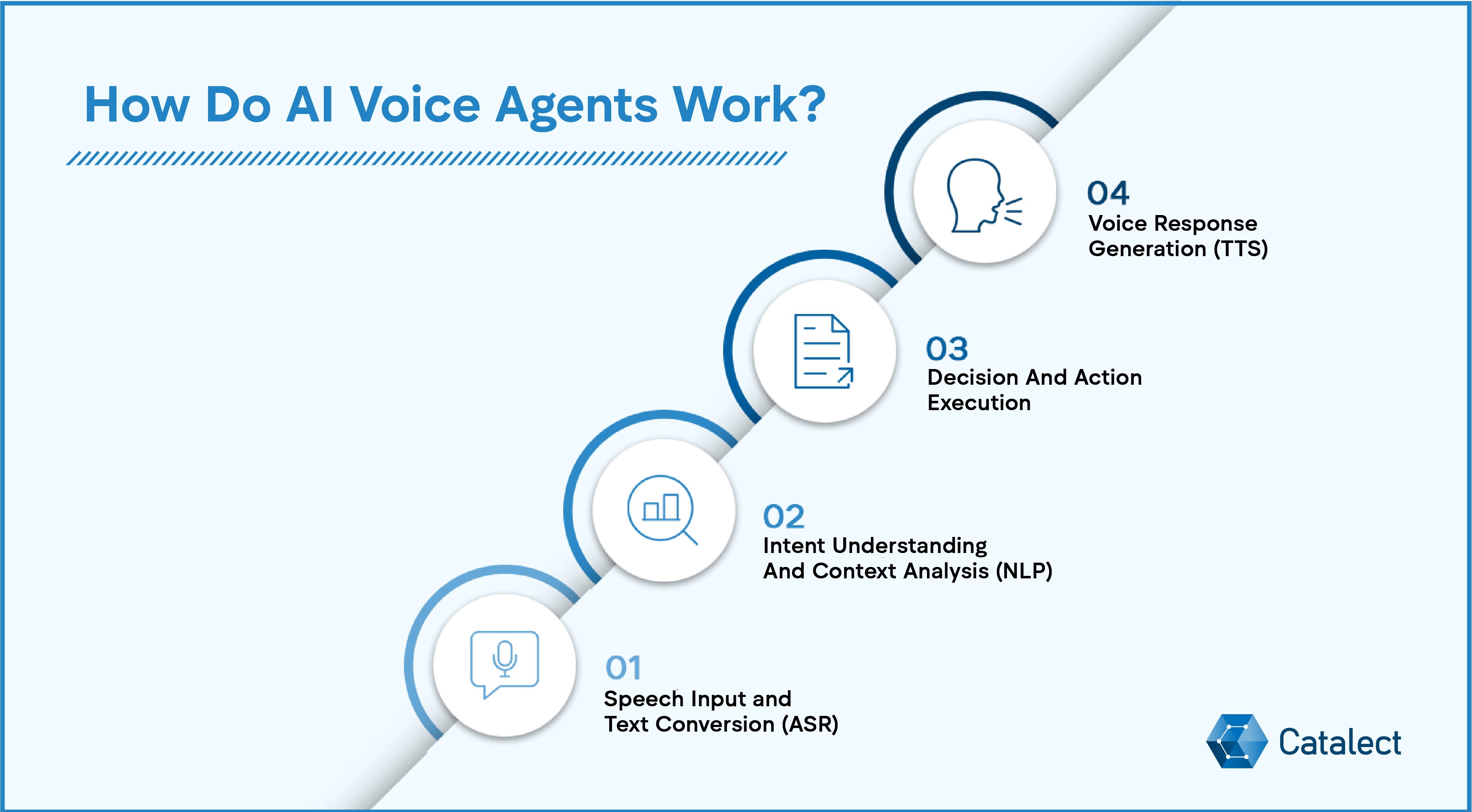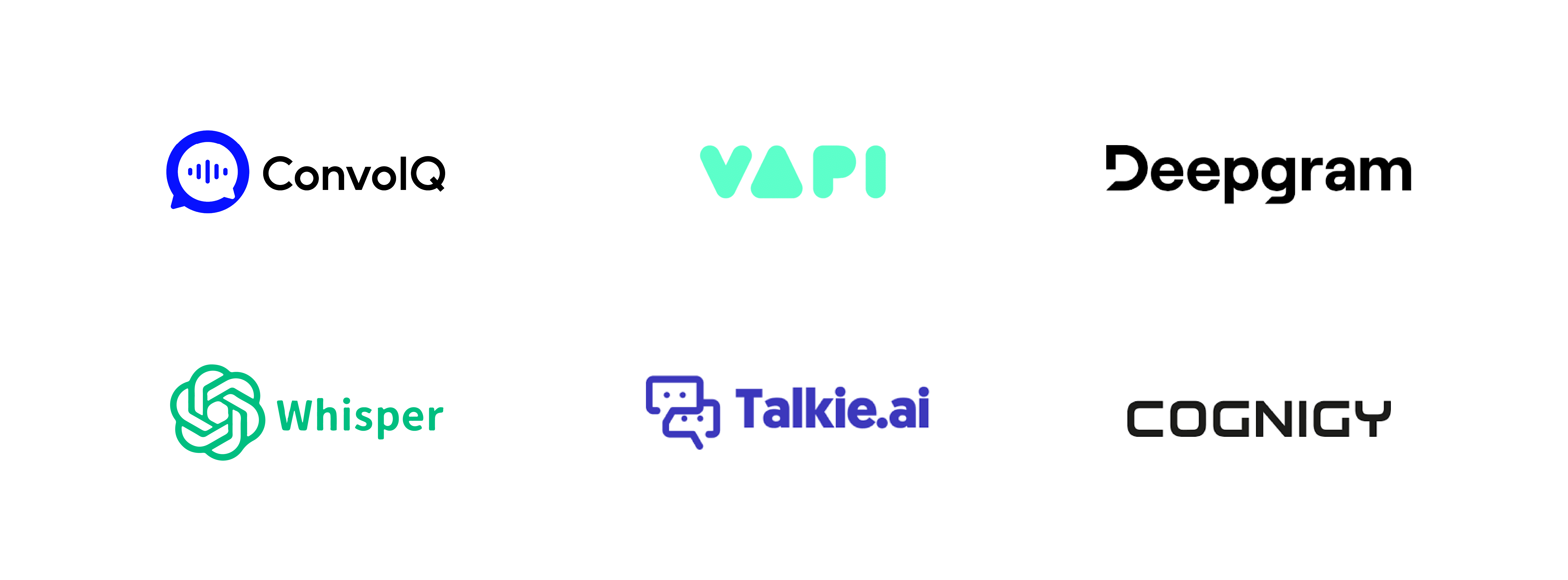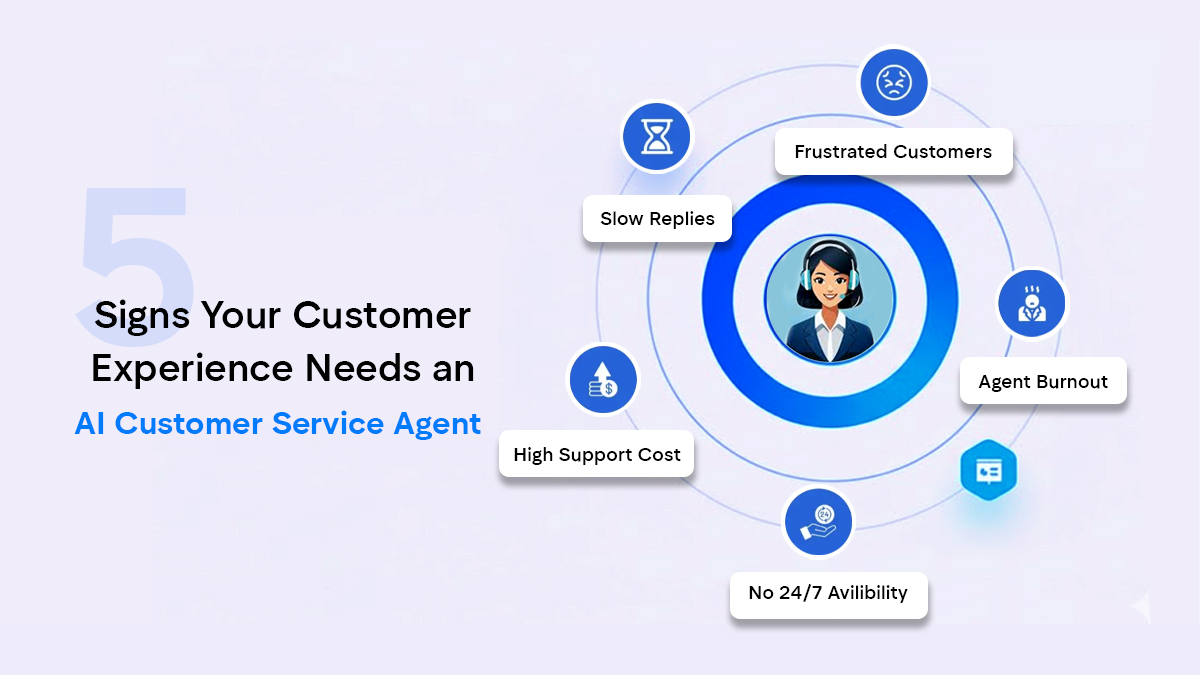What Are AI Voice Agents?
An AI Voice Agent is an intelligent system capable of engaging in real-time, natural spoken conversations with users through phone, VoIP, or embedded communication channels. These agents use Automatic Speech Recognition (ASR), Natural Language Processing (NLP), and Text-to-Speech (TTS) technologies to understand intent, process requests, and respond conversationally without any human intervention.
Unlike traditional IVR systems that rely on rigid menu options, AI Voice Agents are context-aware. They can understand intent, tone, and conversation flow, allowing interactions that feel natural and human-like. For instance, when a customer calls to reschedule an appointment or track an order, the AI agent can interpret nuances, verify details, and take action independently.
In short, AI Voice Agents represent the next evolution of conversational AI, bringing together voice, data, and decision intelligence to deliver scalable, always-available customer engagement.
Why Do AI Voice Agents Matter?
Customer expectations are rising faster than most businesses can keep up. People now expect instant, personalized, and effortless support, whether they’re asking about a product, resolving billing issues, or scheduling a service. Meeting that standard around the clock is tough for human teams, which is where AI Voice Agents make a real difference.
These intelligent systems combine automation, natural language understanding, and real-time speech processing to help companies deliver faster and more consistent experiences without increasing support staff. According to McKinsey’s latest analysis, businesses using generative AI in customer service have seen up to 50% savings in quality assurance costs, a 25–30% increase in agent efficiency, and a 5–10% boost in customer satisfaction. This shows how AI-driven conversations can improve both customer outcomes and internal performance.
The industry numbers tell the same story. As reported by WhatsTheBigData, the global AI customer service market is expected to reach $47.82 billion by 2030, growing at a CAGR of 25.8%. This growth reflects a clear shift: companies are no longer testing voice AI, they’re integrating it as a key part of how they communicate with customers.
With AI Voice Agents, companies can:
- Provide 24/7 virtual support without needing overnight staff.
- Scale conversations as their customer base grows.
- Reduce operational costs by automating Tier-1 inquiries.
- Maintain a consistent tone and brand experience in every interaction.
In simple terms, AI Voice Agents turn customer support from a reactive process into a proactive and intelligent system that improves satisfaction while helping teams work smarter.
(For more insights, explore our blog on how AI chatbots are transforming customer experience.)
Key Features of Voice AI Agents
The best AI Voice Agents stand out because they do more than just recognize their voice. They think, understand, and act intelligently, bringing a natural flow to customer interactions while improving overall support efficiency.
1. Automatic Speech Recognition (ASR): Converts spoken language into accurate text, adapting to different accents, background noise, and speech patterns to ensure every word is understood correctly.
2. Natural Language Understanding (NLU): Goes beyond words to interpret intent, tone, and sentiment, allowing AI Voice Agents to deliver responses that feel human and context aware.
3. Text-to-Speech (TTS): Generates realistic, brand-aligned voices that make conversations sound natural and engaging rather than robotic or scripted.
4 Intent Learning and Adaptation: Improves over time by learning from every customer interaction, enhancing accuracy, and refining responses for better conversational experiences.
5. CRM and Workflow Integration: Connects seamlessly with platforms like HubSpot, Salesforce, and Zendesk, allowing real-time access to customer data and ensuring smooth process automation.
6. Analytics and Insights: Tracks performance metrics, escalation trends, and conversation success rates, helping teams identify opportunities to improve both efficiency and customer experience.
7. Omnichannel Compatibility: Expands beyond traditional calls by integrating with digital touchpoints such as WhatsApp, websites, and mobile apps, creating a unified customer journey.
Together, these features make AI Voice Agents truly intelligent, capable of listening, learning, and responding in ways that build trust, efficiency, and satisfaction at every interaction.
How Do AI Voice Agents Work?
AI Voice Agents operate at the intersection of voice technology, data analytics, and decision intelligence, transforming spoken language into actionable business outcomes. What makes them powerful isn’t just their ability to recognize words, but it’s their capacity to understand meaning, respond naturally, and execute tasks seamlessly in real time.
The process unfolds through a series of intelligent steps that mimic human cognition:

1. Speech Input and Text Conversion (ASR)
When a customer speaks, the Automatic Speech Recognition (ASR) engine captures the audio, filters background noise, and converts speech into text. Advanced ASR systems can identify accents, speech patterns, and even emotions, ensuring accuracy across diverse customer interactions.
2. Intent Understanding and Context Analysis (NLP)
Once converted to text, Natural Language Processing (NLP) models analyze the content to interpret intent, sentiment, and context. The AI Voice Agent doesn’t just hear what’s said; it also understands what’s meant. For example, if a customer says, “I didn’t receive my package,” the system detects both frustration and purpose, prompting an empathetic and relevant response.
3. Decision and Action Execution
After identifying the intent, the agent connects with integrated business systems such as CRMs, ticketing platforms, or ERP databases to fetch relevant information or perform an action. It might check order status, log a support ticket, or reschedule a delivery, completing these tasks in seconds without human involvement.
4. Voice Response Generation (TTS)
Finally, the Text-to-Speech (TTS) engine converts the system’s response into a natural, human-like voice. Modern TTS models can adjust tone, pace, and warmth to match a brand’s personality, making every conversation feel personal and consistent.
The entire process happens within 300 milliseconds, ensuring a seamless, human-like interaction. The Best AI Voice Agent Platforms like ConvoIQ also incorporate agentic workflows: where agents self-improve through contextual memory and decision loops (learn more about this in our blog on agentic workflows in SaaS)
Top Use Cases of AI Voice Agents
AI Voice Agents are redefining industries by blending automation with personalization. Let’s explore their impact across industries:

1. Telecom
In the telecom industry, AI Voice Agents are helping companies manage large call volumes and improve response times. They assist customers with plan activations, billing inquiries, troubleshooting, and account management. Telecom providers are now able to handle millions of calls efficiently while maintaining consistent service quality. This automation allows human agents to focus on complex cases that require empathy or problem-solving. The result is faster resolution, reduced operational costs, and stronger customer satisfaction.
2. Healthcare
In healthcare, AI Voice Agents are improving how patients interact with providers. They can manage appointment scheduling, send reminders, handle follow-ups, and even assist with patient triage. Hospitals and clinics benefit from smoother communication and shorter wait times, while patients enjoy round-the-clock accessibility to basic healthcare support. This automation reduces administrative workload and allows medical staff to dedicate more time to patient care and critical tasks that require a human touch.
3. Finance and Banking
Financial institutions are using AI Voice Agents to make customer interactions faster, safer, and more convenient. These systems help users verify their identity, check account balances, confirm transactions, and access financial information without waiting in long queues. They also play a growing role in fraud detection and compliance by recognizing unusual patterns and flagging suspicious activity. Banks and fintech firms gain efficiency, while customers experience quicker and more secure service.
4. Operations and Logistics
In logistics, AI Voice Agents are bringing real-time visibility and precision to complex supply chains. They can confirm deliveries, provide shipment updates, assist drivers with route information, and handle customer notifications automatically. This constant communication reduces errors, improves coordination, and keeps operations running smoothly. For logistics teams, voice automation saves valuable time and ensures that both customers and partners receive accurate information when it matters most.
5. Travel and Hospitality
The travel and hospitality industry is also embracing AI Voice Agents to make experiences more seamless for travelers. Customers can use voice assistance to check flight status, modify bookings, and receive personalized travel recommendations. Hotels and airlines use these agents to provide multilingual support and instant answers to frequent questions, ensuring guests feel supported around the clock. This combination of convenience and personalization creates a smoother and more enjoyable travel experience.
6. Customer Support and Sales
Across every sector, AI Voice Agents are bridging the gap between automated customer support and sales. They handle routine Tier-1 queries, qualify leads, and schedule demos with natural, human-sounding conversations. Businesses that use AI Voice Agent Platforms for automated customer support and sales systems see improvements in response time, conversion rates, and team productivity. By taking over repetitive conversations, voice AI in sales allows human representatives to focus on building meaningful customer relationships and closing high-value opportunities.
Every industry benefits from AI Voice Agents in its own way. They enable personalization while maintaining empathy and accuracy. By combining Conversational AI, Contextual AI, and automation, these systems create interactions that feel both natural and valuable, driving AI-driven customer engagement across all touchpoints.
(Also read: Chatbots vs AI Agents, What’s the Real Difference?)
Top AI Voice Agent Platforms for Customer Support
1. ConvoIQ
ConvoIQ is an advanced AI Voice Agent platform that integrates ASR, NLU, and TTS with deep analytics, CRM integrations, and customizable workflows. It helps businesses automate customer support and sales, offering an easy-to-use no-code environment for rapid deployment without complex infrastructure.
Why it stands out: ConvoIQ enables businesses to streamline interactions across multiple channels with real-time transcription, intelligent responses, and seamless handoffs to human agents, making it ideal for companies looking to optimize customer service automation.
2. Vapi
Vapi is an API-first platform built for developers, offering customizable AI voice capabilities, real-time transcription, and multi-language support. It’s perfect for businesses embedding voice automation directly into apps and systems, providing full control over how AI interacts with customers.
Why it stands out: Vapi’s developer-friendly environment allows businesses to mold the AI agent to their specific needs, making it a flexible solution for teams looking for complete customization.
3. Deepgram
Deepgram is renowned for its high-fidelity ASR engine that ensures fast and accurate speech-to-text processing. It’s particularly valuable for enterprise-grade automation, supporting customer service operations with high volumes of voice data.
Why it stands out: Deepgram’s powerful ASR technology allows businesses to process large-scale voice data quickly, making it a top choice for enterprises needing robust, real-time voice recognition for customer support.

4. OpenAI Whisper
OpenAI Whisper is an open-source speech recognition model optimized for multilingual transcription. It’s perfect for global businesses that need accurate speech understanding across diverse languages and accents.
Why it stands out: As an open-source solution, Whisper provides flexibility for businesses that require accurate, multilingual speech recognition without being locked into proprietary systems.
5. Talkie.ai
Talkie.ai is a healthcare-focused AI Agent platform that automates patient communication through voicebots. It handles tasks like appointment scheduling, prescription refills, FAQs, and advanced call routing, available in multiple languages.
Why it stands out: Talkie.ai enhances patient engagement by providing 24/7 support, reducing staff workload, and integrating seamlessly with Electronic Health Records (EHR) systems to streamline workflows.
6. Cognigy
Cognigy is an enterprise-grade AI Agent platform designed for large-scale customer support automation. It offers features like humanlike voices, best-in-class speech-to-text, real-time translation, and seamless contact center integration.
Why it stands out: Cognigy’s platform supports over 100 languages and integrates with more than 30 channels, including certified contact center integrations, providing a comprehensive solution for global customer service operations.
How to Select the Right AI Voice Agent Platform
Choosing the right platform requires careful evaluation:
- Integration Depth: Ensure compatibility with your CRM, analytics, and telephony stack.
- Customization & Logic Control: Choose platforms offering no-code branching and conversation design.
- Performance & Latency: Response times over 300ms degrade customer experience.
- Observability & Analytics: Insights into call metrics, escalation trends, and agent accuracy are critical.
- Accent & Language Support: For global reach, adaptability to dialects is key.
- Security & Compliance: Prioritize platforms with data encryption and audit trails.
- Flexible Pricing: Opt for scalable, pay-as-you-grow models. Pilot Mode: Always test in sandbox before full deployment.
Ultimately, the best AI voice agent platform is the one that integrates seamlessly with your workflows while evolving with your business needs.
Conclusion: The Future of AI Voice Agents
The future of customer support automation is voice-first, intelligent, and proactive. AI Voice Agents will continue to blend linguistic intelligence with business logic, creating systems that not only respond but also reason.
For startups and mid-size businesses, the opportunity lies in adopting platforms that scale intelligence rather than headcounts. Solutions like ConvoIQ make it possible to build a 24/7 AI-powered support ecosystem that’s personalized, efficient, and measurable.
Want to modernize your customer support with conversational automation?
Contact Catalect to explore how our AI capabilities can help you lead the shift.



.jpg)



